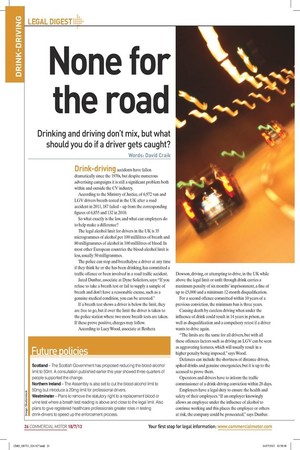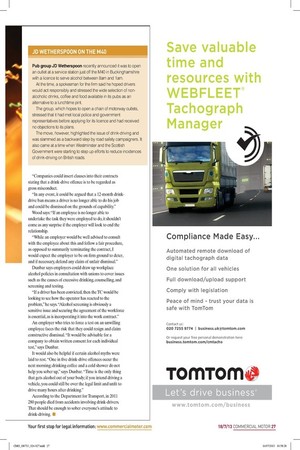None for the road Drinking and driving don't mix, but what should you do if a driver gets caught?
Page 20

Page 21

If you've noticed an error in this article please click here to report it so we can fix it.
Words: David Craik Drink-driving accidents have fallen dramatically since the 1970s, but despite numerous advertising campaigns it is still a significant problem both within and outside the CV industry.
According to the Ministry of Justice, of 6,972 van and LGV drivers breath-tested in the UK after a road accident in 2011, 187 failed up from the corresponding figures of 6,855 and 132 in 2010.
So what exactly is the law, and what can employers do to help make a difference?
The legal alcohol limit for drivers in the UK is 35 microgrammes of alcohol per 100 millilitres of breath and 80 milligrammes of alcohol in 100 millilitres of blood. In most other European countries the blood-alcohol limit is less, usually 50 milligrammes The police can stop and breathalyse a driver at any time if they think he or she has been drinking, has committed a traffic offence or been involved in a road traffic accident.
Jared Dunbar, associate at Dyne Solicitors, says: "If you refuse to take a breath test or fail to supply a sample of breath and don't have a reasonable excuse, such as a genuine medical condition, you can be arrested."
If a breath test shows a driver is below the limit, they are free to go, but if over the limit the driver is taken to the police station where two more breath tests are taken. If these prove positive, charges may follow.
According to Lucy Wood, associate at Rothera Dowson, driving, or attempting to drive, in the UK while above the legal limit or unfit through drink carries a maximum penalty of six months' imprisonment, a fine of up to £5,000 and a minimum 12-month disqualification.
For a second offence committed within 10 years of a previous conviction, the minimum ban is three years.
Causing death by careless driving when under the influence of drink could result in 14 years in prison, as well as disqualification and a compulsory retest if a driver wants to drive again.
"The limits are the same for all drivers, but with all these offences factors such as driving an LGV can be seen as aggravating features, which will usually result in a higher penalty being imposed," says Wood.
Defences can include the shortness of distance driven, spiked drinks and genuine emergencies, but it is up to the accused to prove them.
Operators and drivers have to inform the traffic commissioner of a drink-driving conviction within 28 days.
Employers have a legal duty to ensure the health and safety of their employees. "If an employer knowingly allows an employee under the influence of alcohol to continue working and this places the employee or others at risk, the company could be prosecuted," says Dunbar. "Companies could insert clauses into their contracts stating that a drink-drive offence is to be regarded as gross misconduct.
"In any event, it could be argued that a 12-month drinkdrive ban means a driver is no longer able to do his job and could be dismissed on the grounds of capability."
Wood says: "If an employee is no longer able to undertake the task they were employed to do, it shouldn't come as any surprise if the employer will look to end the relationship.
"While an employer would be well advised to consult with the employee about this and follow a fair procedure, as opposed to summarily terminating the contract, I would expect the employer to be on firm ground to deter, and if necessary, defend any claim of unfair dismissal."
Dunbar says employers could draw up workplace alcohol policies in consultation with unions to cover issues such as the causes of excessive drinking, counselling, and screening and testing.
"If a driver has been convicted, then the TC would be looking to see how the operator has reacted to the problem," he says. "Alcohol screening is obviously a sensitive issue and securing the agreement of the workforce is essential, as is incorporating it into the work contract."
An employer who tries to force a test on an unwilling employee faces the risk that they could resign and claim constructive dismissal. "It would be advisable for a company to obtain written consent for each individual test," says Dunbar.
It would also be helpful if certain alcohol myths were laid to rest. "One in five drink-drive offences occur the next morning; drinking coffee and a cold shower do not help you sober up," says Dunbar. "Time is the only thing that gets alcohol out of your body; if you intend driving a vehicle, you could still be over the legal limit and unfit to drive many hours after drinking."
According to the Department for Transport, in 2011 280 people died from accidents involving drink-drivers. That should be enough to sober everyone's attitude to drink-driving. •








































